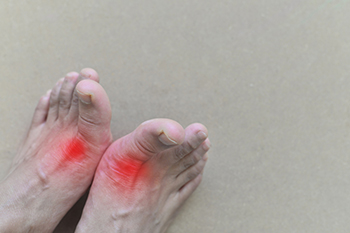Middlefield (860) 349-8500
Wallingford (203) 294-4977
Middlefield (860) 349-8500
Wallingford (203) 294-4977

Gout is a form of arthritis characterized by sudden, severe pain, redness, and swelling in the joints, often affecting the big toe. It occurs when uric acid builds up in the body, forming sharp crystals in the joints. Common causes include a diet high in purines which are found in red meat, seafood, and alcohol, as well as obesity, certain medications, and medical conditions like hypertension. Symptoms include intense pain during attacks, which come on suddenly and can last for days. Gout also results in swelling, redness, heat, tenderness, and stiffness in the affected joint. Chronic gout can lead to joint damage if untreated. Treatment options include medications to reduce pain and inflammation, lifestyle changes such as dietary adjustments, and maintaining a healthy weight. A podiatrist can provide specialized care, offering tailored advice and treatments to manage gout effectively. If you are experiencing symptoms of gout, it is suggested that you make an appointment with a podiatrist to discuss your condition and explore comprehensive treatment options.
Gout is a painful condition that can be treated. If you are seeking treatment, contact Dr. Gordon Fosdick from Affiliated Foot Care Center. Our doctor will treat your foot and ankle needs.
What Is Gout?
Gout is a form of arthritis that is characterized by sudden, severe attacks of pain, redness, and tenderness in the joints. The condition usually affects the joint at the base of the big toe. A gout attack can occur at any random time, such as the middle of the night while you are asleep.
Symptoms
Risk Factors
Prior to visiting your podiatrist to receive treatment for gout, there are a few things you should do beforehand. If you have gout you should write down your symptoms--including when they started and how often you experience them, important medical information you may have, and any questions you may have. Writing down these three things will help your podiatrist in assessing your specific situation so that he or she may provide the best route of treatment for you.
If you have any questions, please feel free to contact our offices located in Middlefield and Wallingford, CT . We offer the newest diagnostic and treatment technologies for all your foot care needs.